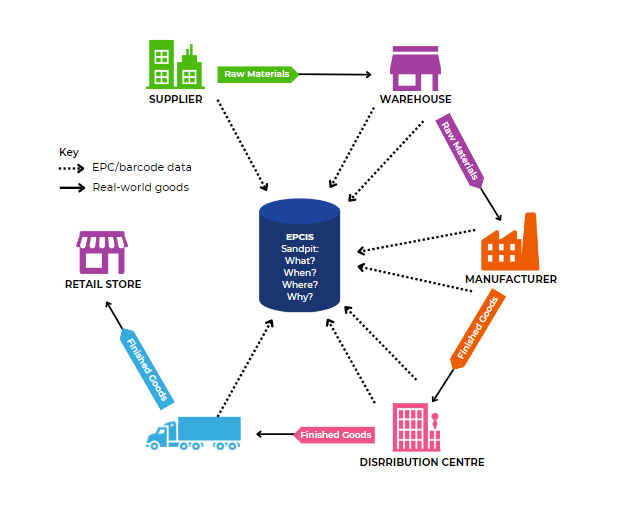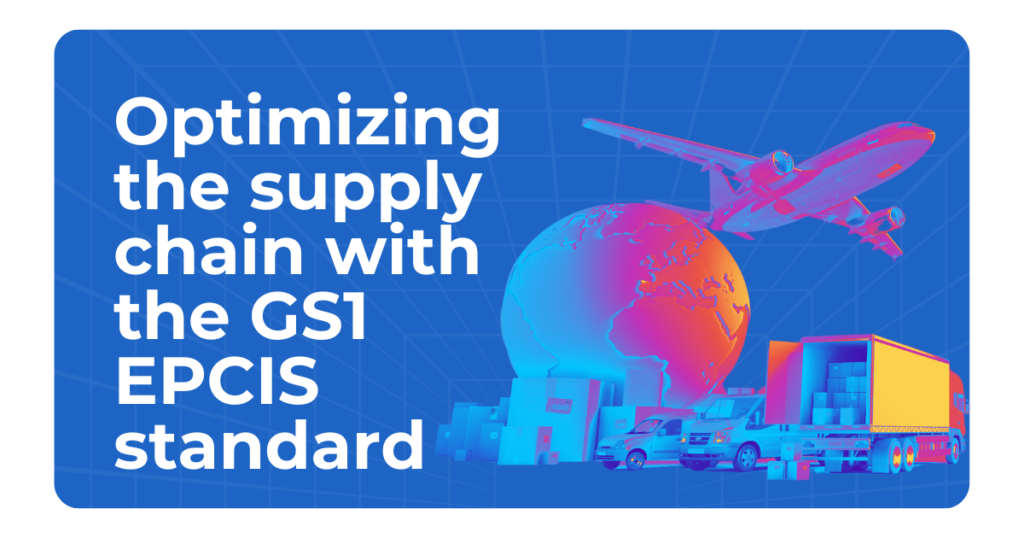Optimizing the Supply Chain with Sustainable Innovation through GS1's EPCIS Standard
Precision and transparency within the supply chain are crucial elements to ensure quality and sustainable products. Due to the growth of demands and regulations, the need for advanced solutions that offer traceability and transparency is increasing, and one of these solutions is our Digital Product Passport (DPP). Para crear una solución adaptable a nivel global, es necesario usar estándares claros y accesibles para todos. En el caso de nuestro DPP, optamos por el estándar EPSIS de GS1, asegurando así una funcionalidad fácil y eficaz en toda la cadena de valor de cualquier industria.
What is GS1 and why is it beneficial?
GS1 is a leading international entity that establishes crucial standards for the identification and communication of products, services, and locations in the global supply chain. Adopting standards provided by GS1 ensures uniformity in the recording and sharing of information throughout the supply chain.By standardizing the way data is recorded and shared, GS1 facilitates traceability, providing a common language understandable by all stakeholders in the chain. This standardization optimizes processes, making them more efficient and builds trust, as any entity can easily understand the provided information.
GS1's EPCIS Standard
EPCIS, an important GS1 standard, plays a fundamental role in facilitating the transfer of information between business partners throughout the supply chain, all the way to the end consumer. Its main function is to enable the communication of essential details about the physical movement and status of a product, ensuring transparency in the value chain for both consumers and businesses. The standard provides important details that help understand the fundamental aspects of a process, answering questions such as "what, how, when, and why." This contributes to establishing a clear value chain for both consumers and businesses.In the broader context of GS1 standards, a shared foundation is established for businesses through unique identification codes for products, logistical units, physical locations, documents, service relationships, and other entities. These standards, spanning identification, data capture, information exchange, and use, collectively contribute to an efficient business environment. The integration of various GS1 standards, such as traceability, further enhances operational efficiency and fosters a cohesive ecosystem for companies in various sectors.
Blue Room Innovation: Beyond the GS1 Standard
La fusión entre GS1 y Blockchain representa un salto significativo en la mejora de la trazabilidad. La naturaleza descentralizada y la inmutablidad de la tecnología blockchain, añade una capa adicional de seguridad a los datos del estándar de GS1. Esto no solo hace que la información sea más segura, sino que también la protege, garantizando que los registros de información no se puedan cambiar en toda la cadena de suministro.One of the key products we have at Blue Room Innovation is the Digital Product Passport (DPP), an innovative solution that utilizes blockchain technology. In this context, we enhance the use of the GS1 EPCIS standard by incorporating it as the fundamental basis for storing data.It is worth noting that our Digital Product Passport goes beyond common GS1 standards. By using blockchain technology, we add additional layers of data that integrate specific sustainability indicators according to the needs and particular requirements of each case. This innovative implementation allows us to provide our customers with data traceability that exceeds basic standards, thus offering them a more comprehensive, sustainable, and valuable product.Applications in Different Industries:
- Textile Industry:
En la industria textil, donde la autenticidad de los materiales es vital, nuestra solución del Digital Textile Passport despliega una trazabilidad completa. Desde la fibra inicial hasta el producto final, proporcionamos una visibilidad integral que permite verificar la procedencia de cada tejido. Así, cada pieza de ropa lleva consigo la garantía de su autenticidad y calidad desde sus orígenes.- Packaging and Waste:
En respuesta a la creciente importancia de la sostenibilidad y la nueva ley de cero residuos, nuestro Digital Waste Passport puede ser una buena solución para la industria de envases. Este enfoque permite no solo garantizar la calidad y seguridad alimentaria, sino también cumplir con los requisitos ambientales ofreciendo una trazabilidad total de los datos.- Steel Handling:
In the steel industry, where large masses of this material are handled, our solution ensures complete traceability from smelting to manufacturing. In the specific case of steel, the DPP allows tracking each step of the process, ensuring that each piece meets safety and quality standards for projects of any scale. This traceability not only reinforces confidence in the quality of steel but also contributes to more efficient management of large volumes of material, promoting sustainability.Blue Room: Pioneers in Sustainable Traceability with GS1's EPCIS Standard
Blue Room Innovation leads the way toward exceptional traceability by merging the GS1 standard with blockchain technology. This approach not only reflects our dedication to innovation but also our commitment to sustainability. By incorporating the standard, we not only establish a common language for the supply chain but also ensure efficiency and reliability in data transmission throughout the supply chain.Experts in digital innovation at your service
Discover how Blue Room Innovation transforms ideas into digital solutions with real impact and commitment to sustainability.
Are you ready to be part of the change?
Follow us
Copyright © 2024 Blue Room Innovation Privacy Policy - Legal Warning - Cookies Policy

